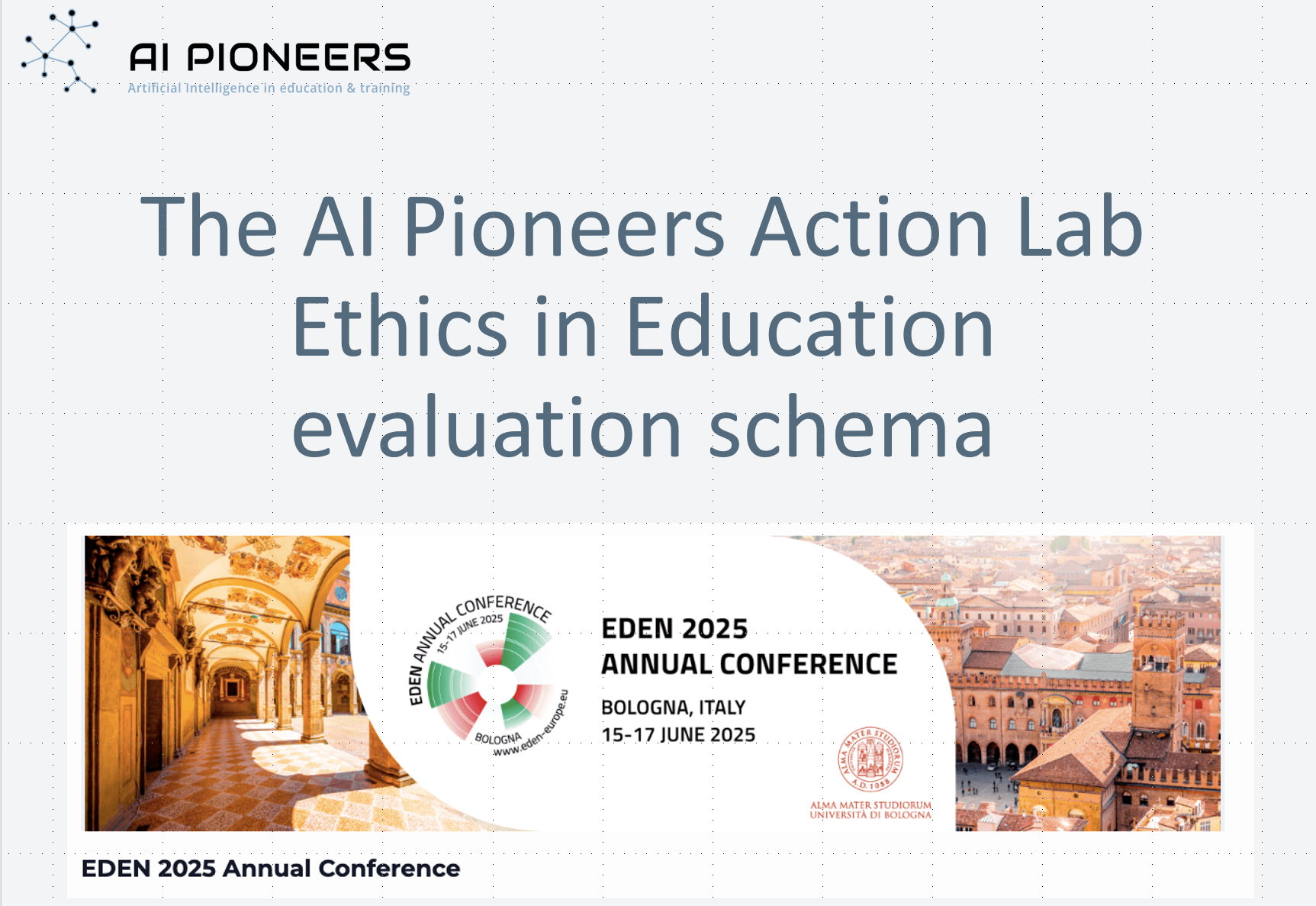AI Pioneers at the EDEN 2025 Annual Conference in Bologna
With three active contributions, AI Pioneers was once again […]
Six Non-Negotiable Principles for Inclusive AI
So many of the newsletters about AI are based on the intersection of technology and business. So it came as welcome relief to find an edition of AI Supremacy talking about AI, psychology, relationships, adaptation, coping and our self-regulation to live more fulfilling lives as individuals. The edition is based on work by Natalia Cote-Munoz of the Newsletter Artificial Inquiry. Natalia says: “The future of human-AI collaboration is being written right now—not in Silicon Valley conference rooms, but in the daily workflows of neurodivergent people who’ve discovered something remarkable: AI tools designed for general use can remove barriers that traditional […]
Top tips for Assessment
Get any group of teachers together and ask them their main concern about AI and the answer will be assessment. Its not really surprising since education systems have built their reputations on the value of assessments, however weak traditional exam systems have been. But of course in vocational education and training in most countries there has been change, with moves towards outcome based curriculum leading to more practical real world assessment exercises. This doesn’t mean vocational teachers don’t have the same concerns over AI and assessment, especially when it comes to assessment of more formal academic learning. In the UK, […]
Podcast: AI in Migrant Education Contexts
The AI Cookbook team reviewed 50 articles of literature relating to using AI in migrant education and then gave it to Google Notebook – here’s the AI generated deep dive podcast.
AI in Adult Education
There is an avalanche of blogs, papers. reports and so on over AI in higher education and in schools. There is not so much about vocational education and training. And as for adult education – it has largely been ignored. I suppose one reason may be that adult education provision varies so much in different countries. And another may be that funding for adult educati9on is generally pretty poor. That is why the latest resource kit “Beyond the Buzz: AI in Adult Education” in the EU EPALE electronic platform and newsletter is so welcome. The faeture asks the central question […]
Fair use? Who owns our data?
There is a growing conversation about data rights, suggesting that the debate over digital ownership is just beginning. Apart from several well publicised legal cases in the USA over scraped data, in the UK the government has been forced to launch an urgent review, after facing a fierce campaign by musicians and employees in the creative industries. The big tech AI companies have been claiming that scraping data for training Large Language Models represents fair use, even when being explicitly asked not to do so. Now the Mastodon social network, launched in 2016, allowing users to create their own servers […]
AI Engagement Methodology for Migrant Education – an Overview
Building on the literature review and field work research recently undertaken by the AI Cookbook project, we are now working on an engagement methodology for AI in migrant education. The AI Engagement Methodology for Migrant Education will present an approach to integrating Artificial Intelligence technologies into educational programs supporting migrant and refugee learners. This methodology emerges from the recognition that migrant learners face unique challenges that require specialised, culturally sensitive, and ethically grounded educational interventions enhanced by AI technologies. Developed within the framework of the EU Erasmus+ funded AI Cookbook project, this methodology addresses the critical gap between the rapid […]
AI and Jobs: the future does not look rosy
Everything can change very fast when Generative AI is involved. Only a few weeks ago I was writing about how although a number of occupations had been hit hard by Gen AL, in general the jobs outlook was relatively good. If course the present USA economic policy (if it can be called that) does not help in trying to work out what is going on. The latest alarm seems to have been kicked off by Anthropic CEO Dario Amodei who said that ordinary people are not ready for the changes AI is about to unleash on the world. In a […]
Public AI for European Education
Introduction Debates over the future of AI in education continue apace. There is increasing advocacy for AI as a public good, and for building on Open Source Software. I originally intended to write just one blog on these ideas but it rapidly grew in length so now I intend to post it as a mini series. This short blog series will guide European teachers and trainers through the key concepts and practical implications of Public AI for education. We’ll explore how open source AI models can provide more transparent and equitable alternatives to commercial systems, examine real-world examples of European […]
AI, Personal Learning Environments, Personalisation, Pedagogy and Agency
Sometimes the sheer volume of posts, newsletters, opinions about AI and education can feel overwhelming. And given the amount of this that seemingly comes from AI, the quality is not always great. But recently there seems to be an encouraging move towards people writing well thought out essays which agree with them or not are raising important issues. One which has made me think is ‘Beyond Augmentation: Toward a Posthumanist Epistemology for AI and Education’, by J. OwenMatson who, his website says, “explores literature, film, art, AI, and educational technology through the lenses of cognition, media theory, and philosophy—tracing how […]


